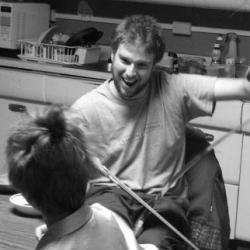On Sunday evening the JACK Quartet, seemingly ubiquitous in new music circles, performed an enlightening array of musical styles at (Le) Poisson Rouge, joined by rising young cellist Joshua Roman. The thoughtful programming was almost as chronologically diverse as it could have been. Between Carlo Gesualdo’s 17th-century madrigals and Jefferson Friedman’s Quintet, which was premièred three weeks ago, the music encompassed over three centuries of history. Shifting effortlessly from one era to another, the performance was a distinct success for the new, flexible attitude it embodied.
Most of the music performed was written specifically for the cello quintet, a consort which is undervalued because it has been largely underutilized in performance. One goal of the concert, explicitly stated by JACK violinist Ari Streisfeld, was to advocate for this new instrumentation. To that end, Mr Streisfeld had arranged the three Gesualdo madrigals for cello quintet, setting off the three 21st-century compositions as a surprisingly powerful pedal point. In the second madrigal (Ardita Zanzaretta) both the arrangement and the execution achieved the translation from the mirthful staccato of verbal delivery into gestural nuance audible in the strings’ tone, and in general the phrasing style of the madrigals seemed to translate very well for cello quintet. Though there were occasional moments of passing harmony partly obscured by sul ponticello effects, the risk was worth the reward. Seen in one light the short pieces acted as palate cleansers, but the vitality with which they were executed belied any such secondary hearing.
The first new piece on the program was Joshua Roman’s own Riding Light, an “Opus 1” for solo cello which demonstrated the extraordinary talents of this already-celebrated performer. The motoric rhythms and melodic figures, coming fast on the heels of the opening meditative sequence, drew heavily on post-minimalist tropes and provided the right momentum to the piece. Throughout the piece, Roman would frequently look up from the music, projecting his confidence directly out to the audience; needless to say, his assured demeanor was evident in abundance.
The next 20th-century work was in many ways the rock of the program: Brian Ferneyhough’s Exoridum, a piece written for Elliot Carter’s 100th birthday. 43 extremely short passages, many performed attacca, are a clear homage to Carter’s famous structural conceits in his string quartets, particularly nos. 1 and 2. In addition, occasionally pauses would be held in one instrument while others distinctly paused, suggesting that the audience was hearing different movements simultaneously. Without consulting the score these may simply be mishearings, but in any case the avid and meticulous listener is well rewarded by this (as well as most!) work of the New Complexity school. As specialists in contemporary and intensely rigorous music, The JACK Quartet gave voice to Ferneyhough’s 2008 work with both sensitivity and ferocity, each in the right place and measure.
The final madrigal, Gesualdo’s Ardo per te, mio bene, was perhaps lent some additional measure of interest by comparison with the Ferneyhough. This was especially true in comparing the treatment of phrasing in the idiomatic madrigal style with the much more intricate but still deliberate style of Ferneyhough’s work. After the careful architecture of the latter, the sense of reprieve was not insignificant, though the arrangement still dazzled.
The last piece on the program was Jefferson Friedman’s Quintet, a piece which, along with Riding Light, was a commission of the Town Hall Seattle series. As mentioned, Friedman’s work is absolutely new, having been premièred in Seattle only three weeks ago. The overall feel of the work was a bit more contrapuntal than post-minimal, to compare the artistic voices of the two young composers on the program. The extended harmonies which were reliably engaging throughout the piece were vaguely reminiscent of Hindemith at moments. The only complaint I had as a listener concerned the rhythmic cohesion which Friedman established with such facility: it ought to have fallen apart more completely at the moments when tension appeared – perhaps that is more a matter of taste, but there was something slightly cautious in the sound that never entirely departed.
As a whole, the evening was a positive sign for the future of new music performance as well as innovative programming choices. LPR has been celebrating five years of operation, and this model shows no sign of foundering on the usual problems facing venues of classical music. This may have been said elsewhere already, but if nothing else, other efforts ought to look to LPR as a model for which battles to fight and which to concede.


